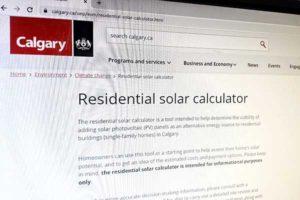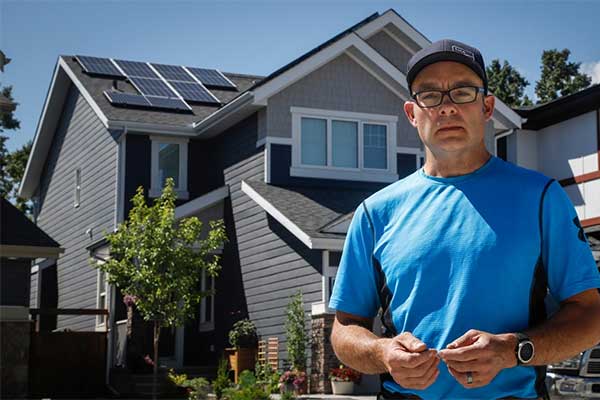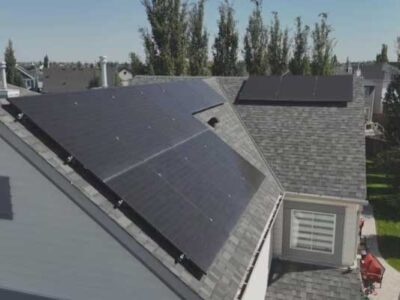- The solar calculator provides cost estimates associated with an installation and an approximate number of panels needed, among other data.
- It offers potential next steps, such as a list of local installers and available provincial grants or rebates.
- One of the most compelling pieces of info it provides, is the potential environmental impact of installing solar panels on an annual basis.
Alberta will soon be home to Canada’s largest solar farm, the Travers Solar Project. The potential for great yields has been acted on by investors and the buzz is inspiring homeowners to follow suite.
This may be why interest in solar is growing in the Alberta city of Calgary, with many projects in development. Even the city is promoting solar with the recent upgrade to its residential solar calculator.
The revamped calculator helps Calgary homeowners determine the viability of adding solar panels to their homes. Created by the City of Calgary, the online calculator is an easy-to-use and accessible starting point for homeowners to assess their home’s solar potential. The city says homeowners who use the calculator get results in seconds.
The first step is entering an address, which will pull up the residence on a color-coded satellite image map showing the average solar yield of the home. The only other information homeowners will need to provide is either the monthly electricity consumption of their home, which is easy to find on an electricity bill or they can pick from three sizes of homes so the tool can estimate electricity usage.
The results provided by the tool can help homeowners get an idea of estimated costs associated with the project as well as the approximate number of panels needed for their home. The costs can be broken down in three ways, depending on whether homeowners plan to buy the solar system upfront, take out a loan, or lease the solar system.

Screen photo of the city of Calgary website showing the residential solar calculator. (pvbuzz)
The total investment for homeowners is estimated as well as the upfront cost, the payback period, and the average monthly savings. The calculations are based on the available roof area to site solar panels and data collected by the City’s Light Detection and Ranging (LiDAR) to estimate the productive roof area.
It considers shading, roof shape, obstructions, orientation, and pitch. Annual electricity generated is estimated for each solar panel using the National Renewable Energy Laboratory’s PVWatts tool to get an idea of the home’s solar potential for the year in generalized optimal conditions.
The calculator then offers potential next steps the homeowner can take. These include available provincial grant or rebate programs as well as a list of solar service providers.
Homeowners can apply for low-interest loans of up to CAD $50,000 from the city of Calgary through the clean energy improvement program (CEIP). Low-interest loans taken out through CIEP to fund solar panel projects can be tacked onto property tax bills and repaid over 15 years. Homeowners may also be eligible for a federal rebate of up to CAD $5000 through the Canada Greener Homes Grant.
It’s important for homeowners to review all this additional information as it could help them make the most of their investment.
Although the residential solar calculator can provide an impressive informational starting point, a customized plan will require consulting a professional solar installer. An experienced firm will be able to conduct a thorough review and offer a precise quote tailored to the homeowner’s needs.
One of the most compelling results the residential solar calculator shows is the potential environmental impact installing solar panels will have on an annual basis. Homeowners can see the positive impact in terms of the amount of carbon dioxide offset, the number of cars taken off the road each year, and the number of tree seedlings planted in a ten-year span.
Installing solar panels can be the right investment for homeowners for many reasons and contributing to Canada reaching its net-zero goal is a significant one guiding residents to make their homes more energy-efficient.













Comments